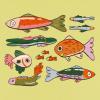February 11, 2025 - 13:51

I was interested by the way Clare traced how disabled people have claimed and been denied relative autonomy throughout history. He discusses in depth his aversion to the word “freak,” owing primarily to the history of freak shows. While part of the piece discusses how aspects of the freak show afforded certain performers a level of autonomy, many others were kidnapped, bought, and taken advantage of. There is some level of power and subversion associated with taking advantage of the gullibility of a white, nondisabled audience and/or flaunting disability, but it exists against the backdrop of exploitation and a lack of choice. At the time, disabled people had almost no options for supporting themselves, so some chose to perform in freak shows, but this was not actually much of a choice at all. Performing may have offered an individual some financial autonomy, but they had no control over the way they were systematically dehumanized by audiences. This reminds me of Clare's discussion of phrases used as alternatives for disability, discussed earlier in the text. He says:
"In the world as it should be, maybe disabled people would be differently-abled: a world where Braille and audio-recorded editions of books and magazines were a matter of course, and hearing people signed ASL; a world where schools were fully integrated, healthcare, free and unrationed; a world where universal access meant exactly that; a world where disabled people were not locked up at home or in nursing homes, relegated to sheltered employment and paid sweatshop wages. But, in the world as it is, differently-abled, physically-challenged tell a wishful lie."
Euphemisms like "differently-abled" seek to obscure the reality that disabled people still face a lack of autonomy due to the ignorance and neglect (if not outright exploitation and exclusion) of nondisabled society. While it's easy to cite more inclusive education, greater physical accessibility of public spaces, shifting mindsets towards disability, etc and assert that freak shows are a relic of the past, disabled people continue to be systematically dehumanized in a less overt manner. Phrases like this erase both the history and present reality of the disabled experience.
